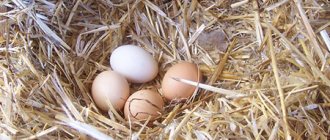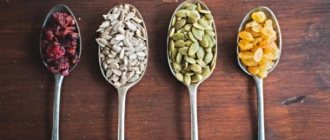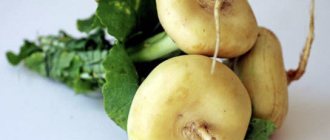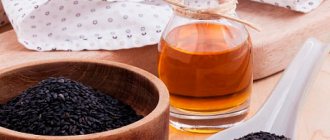What you eat and put on your skin becomes especially important during pregnancy, so be prepared for a long list of don'ts from your doctor.
Photo: Depositphotos.com. Author: Tainar.
Among the components of the diet, undeservedly branded as “dangerous” for a pregnant woman, was sesame (sesame). This misconception is associated with the ancient healing practice of Ayurveda, which classifies sesame seeds as so-called “hot” foods that create heat in the abdomen and, therefore, can provoke a miscarriage. It is important to understand that medical research does not support this point of view.
Sesame seed and its benefits and harms during pregnancy
The body of the expectant mother needs to work for two. Her body undergoes certain changes, and there is often a lack of any trace elements or vitamins, which can lead to diseases .
This is where sesame comes to the rescue, as it has a beneficial effect on many aspects of health:
- The cells of the placenta are renewed
- a healthy placenta provides the baby with useful substances; - Prevention of anemia
– sesame is a source of iron; - Hormonal levels are stabilized
by eating a little sesame oil; - Teeth become stronger
- calcium deficiency often occurs during pregnancy, and sesame contains a large amount of this element; - Constipation
- such an unpleasant thing can be easily eliminated with the help of sesame, which also perfectly cleanses the intestinal walls; - Immunity increases
- a pregnant woman should not get sick, this can negatively affect the health of the fetus;
During pregnancy, sesame seeds perfectly remove salts from the body, which means they are involved in the process of preventing edema.
In addition, eating sesame seeds during pregnancy is an excellent way to prevent mastopathy and normalize the frequency of urination. Seeds replace cholesterol, improve metabolism and act as cancer prevention .
In addition, this oriental product is a source of energy and relief from stress.
Compound
According to an article in the American daily San Francisco Chronicle, sesame is one of the seven superfoods every expectant mother needs.
- Sesame seeds are rich in calcium, which is necessary to maintain healthy bones in a pregnant woman and for the formation of the musculoskeletal system of the fetus.
- Being an excellent source of iron (1 mg per 2 tablespoons), sesame prevents the development of anemia and promotes the production of new blood cells. During pregnancy, a woman needs 27 mg of iron on an ongoing basis, while in other periods of life the need for this microelement is reduced to 18 mg.
Sesame seeds are also rich in amino acids, vitamins B, C, E - nutrients necessary during the perinatal period.
Can pregnant women eat bananas?
Substances in sesame seeds that are beneficial during pregnancy
To assess the usefulness of seeds, it is worth considering their composition:
- Iron and calcium
- to prevent anemia and tooth decay in the mother and strengthen the bones of the baby; - Magnesium
– relieves muscle spasms, reduces irritability; - Vitamins A, B, C and E
- if the expectant mother is already taking a complex of vitamins, then you should not consume a lot of sesame, this can lead to an overdose, since sesame seeds are rich in vitamins.
Interesting! Sesame contains phytoestrogens, which is very useful when planning pregnancy, especially if a woman has problems with lowering estrogen, and therefore with conception.
Nutritional value of sesame seeds:
The nutritional value of whole, roasted or toasted sesame seeds per 100g serving is as follows:
| nutrient | Amount per serving |
| Calories | 565kCal |
| carbohydrates | 25.7g |
| squirrel | 17g |
| Alimentary fiber | 14g |
| Fat | 48g |
| calcium | 989mg |
| magnesium | 356mg |
| phosphorus | 638mg |
| Vitamin A | 9IU |
| Thiamine | 0.8 mg |
| Niacin | 4.6mg |
| folate | 98mcg |
If you're interested in adding sesame to your diet, we'll tell you how you can do it.
How to properly consume sesame seeds while pregnant
Healthy foods can also be harmful if consumed in the wrong dosage. Only about 20 grams of seeds per meal is enough. When fried, the seed is no longer so healthy - it loses most of the elements necessary for the body, but continues to give food a pleasant aroma.
Sesame seeds during pregnancy are used as follows:
- As a baking sprinkle;
- Additive to yogurt or cottage cheese;
- The oil from these seeds is an excellent salad dressing;
- Kozinaki made from sesame seeds is a good snack.
The seeds promote healthy fetal growth, as long as they are consumed in moderation.
FAQ
Are black sesame seeds healthier than white sesame seeds?
Yes, black sesame seeds are healthier than white sesame seeds due to their high nutritional profile. White sesame seeds are usually hulled while black sesame seeds are unhulled, and the hull is an important source of nutrients, especially calcium. Although the hulled variety also contains calcium, the unhulled variety provides almost 100% of the daily calcium requirement per 100 g of serving sesame.
Is it safe to consume sesame oil (gingelly oil) during pregnancy?
It is completely safe to consume sesame oil during pregnancy. This is a good option, just like olive oil or canola oil, that helps meet your healthy fat requirements. Sesame oil contains a good balance of mono- and polyunsaturated fats, which can keep a child's brain and nerve tissue healthy. These fats also absorb fat-soluble vitamins and minerals that are important for your and your baby's health.
Hope this post helped you clear any doubts about eating sesame seeds during pregnancy.
Pratiwi
Experienced Nutritionist with a demonstrated history of working in the health wellness and fitness industry. Skilled in Nutrition Education, Nutrition Consultation, Diet Planning, Food & Beverage, Content Creation and Public Speaking. Strong healthcare services professional with a Bachelor's Degree in Nutrition from Universitas Indonesia (UI).
Are sesame seeds harmful?
There is an opinion that sesame seeds during pregnancy can cause great harm, resulting in a miscarriage. However, medical research does not confirm this. But these seeds still have contraindications:
- Sesame can trigger allergies;
- Large doses of sesame oil may cause uterine cramps;
- Excess seeds in the diet can lead to weight gain;
- A large amount of calcium in sesame seeds can lead to the absence of fontanel in a newborn;
- Sesame is dangerous for mothers with urolithiasis, since large consumption of these seeds causes the formation of salts in the kidneys, and subsequently stones.
How much calcium is in sesame
Sesame is sometimes called the champion in calcium content, and this is not an exaggeration. 100 grams of seeds contain almost one and a half thousand milligrams of calcium. This is a lot, and calcium is a very important mineral for the body. One and a half grams of calcium is a daily dose and even a little more, considering that the daily dose required by the average person is 1.2-1.3 grams. This amount of calcium is enough for the cells to function properly, and the bones will not use up their reserves, which will only allow them to be stronger. Calcium obtained from sesame is very well absorbed by the body - this is another plus for the seeds.
Calcium absorption is affected by the following:
:
- If vitamin D enters the body with calcium. There is little of it in foods, but there is enough in sunlight, so after eating sesame, you should take a walk in the fresh air under the rays of the sun.
- Calcium is perfectly absorbed with phosphorus, and there is a lot of phosphorus in fish and seafood, so such dishes would be an excellent addition to sesame or sesame can be cooked with fish - a good and interesting culinary move and it is digested and easier to breathe.
- After taking sesame seeds, you should not engage in too much sports or other physical activity, otherwise calcium will simply leave the body naturally due to stress.
And you should not combine sesame with coffee or sorrel, as well as spinach or carbonated drinks - they contribute to the excretion of calcium and its blurring.
Can a nursing mother have sesame seeds?
After the baby is born, the mother takes care of him even more diligently. Now the child receives nutrients through mother's milk. During breastfeeding, sesame seeds introduce a complex of substances into the newborn's body that are useful for its proper development. For a new mother, sesame seeds will help to recover after pregnancy and childbirth by replenishing calcium reserves in the woman’s body.
Sesame is also useful for problems with lactation; it not only promotes milk flow, but also increases its nutritional value.
You should not get carried away with sesame seeds during breastfeeding if the mother is already taking strong drugs to increase calcium. Such an excess can lead to fairly rapid overgrowth of the baby’s fontanel, which can cause high intracranial pressure.
Published: 11/16/2017 (Updated: 02/05/2018)
Methods of use
The rich composition of macro and microelements in sesame seeds makes it a unique and universal product.
Sesame is used:
- in cooking;
- in cosmetology;
- in medicine.
Sesame is sometimes called the "king of calcium" . Therefore, before preparing dishes with the addition of sesame, it is important to remember a few simple rules:
- Heat treatment of the product reduces the calcium content. If you want to sprinkle the dish with sesame seeds, do it already prepared.
- Calcium is absorbed worst of all in the evening, so try to plan your diet in such a way that the sesame product enters your body before six o'clock in the evening.
- Mothers need calcium most at 5-7 weeks of pregnancy and during breastfeeding.
Sesame can be used not only as a dusting . Milk and even kefir are made from the seeds.
Sesame seeds go well with almost all foods. They can be added to dishes whole or ground. Even adding a little sesame to the porridge will give the dish a subtle nutty flavor.
Sesame is combined with cinnamon and coriander, complements the taste of dishes in tandem with dill and parsley, and enriches the dish with flavor along with onions and garlic.
Do not ignore the use of sesame oil. The secret is that the method of obtaining it allows you to preserve all the useful vitamins and microelements in the product.
Therefore, it can be safely used as salad dressings, for frying and stewing meat, fish, and also in making soups.
Sesame oil is popular not only in cooking. It is often used for cosmetic purposes.
The expectant mother can make a hair mask from it. Zinc in sesame oil strengthens its structure, accelerates growth and restores healthy beauty and shine to hair.
As a face mask, sesame oil helps restore youth and elasticity to the skin. It penetrates deeply into the pores, softens the skin and cleanses it.
In medicine, sesame is valued for its beneficial properties and it is recommended to consume at least one teaspoon of sesame seeds per day. They:
- prevent aging;
- have protective properties and antibacterial effects;
- have a healing effect and relieve toothaches;
- tones and has a cleansing effect.
Sesame is used to treat the digestive, respiratory, cardiovascular, nervous, genitourinary and endocrine systems.
Sesamin is a natural antioxidant found in sesame seeds that helps lower blood cholesterol levels.
It destroys pathological cells, and the essential oil contained in sesame reduces the risk of joint disease, cleanses the blood and helps lower blood pressure.
What effect does sesame have on the body of a pregnant woman?
Sesame prevents the following problems in the body:
- eliminates constipation (fights constipation just as well as);
- increases immunity;
- strengthens teeth and gums;
- normalizes the frequency of urination;
- strengthens the physical health of the body as a whole;
- helps fight anxiety.
The development of all these problems is hindered for various reasons. This softening of feces and normalization of peristalsis of the intestines, bladder, stomach and other hollow organs, the presence of many, many natural compounds, helps muscles and nerves not be too toned, but not flabby, and niacin, which is part of sesame seeds, has a beneficial effect on the nervous system as a whole.
In addition to improving the health of the body by eating healthy foods, you need to take care of the appearance of the skin on a woman’s body. After all, pregnancy is not a reason to let yourself go. Sesame oil has been used in medicinal cosmetics since ancient times. In addition, this oil is good to use for massage. And if you rinse your mouth with sesame oil, you can avoid many dental problems. In addition, sesame seed oil helps heal cracked heels for those expectant mothers who want to maintain a decent, well-groomed appearance of their feet.
How to eat sesame during pregnancy?
Sesame can be used in a variety of dishes. Sesame for pregnant women - how to use? You can add black or white (it doesn’t matter) seeds in the following dishes:
- kozinaki;
- frying oil;
- additions to omelettes, yogurt, buns, roasts, etc.;
- sesame paste (tahini);
- A substitute for regular table salt is gomashio sesame salt.
Harm of sesame
It is worth consulting with your pregnancy doctor about the use of sesame. Based on popular findings, some experts recommend limiting the use of this product in the first trimester. Thus, they just want to play it safe, because science has not proven the connection between miscarriages and eating sesame.
How much sesame to eat during pregnancy? You definitely shouldn’t drink liters of sesame oil. A small handful of seeds will not harm in any way. The danger of excessive consumption of sesame oil can negatively affect hormonal levels and cause uterine contractions. This can definitely cause miscarriage or premature birth.
So how should pregnant women take sesame, or rather the oil from these seeds? A little oil every day, especially if there is minor bleeding, will reduce the risk of miscarriage. After all, a small amount of oil has a positive effect on hormones. But such things as the life of a child, even if unborn, cannot be joked about. Therefore, the dosage of sesame for pregnant women should be determined by the doctor who is managing the pregnancy. And if bleeding occurs, no sesame will save the fetus if you do not seek medical help in a timely manner.
A complete refusal of sesame should be made in case of an allergy to any substances included in sesame in a pregnant woman.
Simple logic will tell you. Firstly, in small quantities in the form of a piece of delicacy (kozinaki) or as an additive to various dishes, and secondly, sesame oil can be used either for frying vegetables or meat, or for dressing fresh salads.
Share your opinion on the benefits of eating sesame during pregnancy
Sesame seeds, which are still cultivated in Central Asia, India and China, have been used since ancient times not only as a seasoning, but also for the preparation of sesame oil. And since it has a lot of useful and medicinal properties, sesame oil has a huge number of different applications, ranging from medicine to baking. The main thing is not to forget that sesame oil, unlike other well-known edible oils, is absolutely impossible to use for frying, and should not be heated at all!
Sesame oil contains many useful substances that help strengthen the immune system, as well as various body systems. In addition, sesame oil for pregnant women helps neutralize the effects of harmful substances on the body.
The way a pregnant woman eats affects the health and development of her baby. Therefore, you need to switch to proper nutrition from the very first day of pregnancy. This means that mother should eat only those foods that are beneficial. This is primarily plant food, which contains large quantities of all those substances that both mother and baby need. Plant foods should be consumed several times a day.
And in order to ensure proper and nutritious nutrition, mothers should pay attention to sesame oil during pregnancy, which contains a large number of useful components.
Despite the fact that the benefits of sesame oil are great, pregnant women should consult a doctor before including it in their diet. There is a category of people for whom sesame oil is harmful. So, if the mother suffers from varicose veins, or has high blood clotting, or has a predisposition to the formation of blood clots, as well as individual intolerance, this product should not be consumed. If everything is in order and the doctor has approved the use of sesame oil, then a pregnant woman can safely include such a product in her diet.
If a mother wants to strengthen her immunity, as well as the body as a whole, then she needs to drink a teaspoon of this product every day during meals. This procedure can be repeated a couple or three times a day.
If a pregnant woman has a problem such as constipation, then in this case the properties of sesame oil will again come to the rescue, which allows you to quickly cope with such a problem. For this purpose, the oil is used as follows. Every day you need to drink a tablespoon of oil. It is best to do this before your first meal, immediately after waking up.
If the mother has poor blood clotting, then, by the way, sesame oil will help. To solve this problem, the oil is applied three times a day immediately before eating. As for the amount of oil at one time, it is a tablespoon.
You can use sesame oil to season various salads and other dishes. But as for using this product hot, including frying with it, this is not acceptable. This oil should not be heated; it can only be used to season ready-made dishes before sitting down to eat.
The need to use sesame oil is also due to the fact that it contains calcium, which is necessary for mother and baby during pregnancy. The oil also contains vitamin C, which plays a special role in preventing colds, which are highly undesirable for a pregnant woman to contract.
In most cases, pregnant women use sesame oil specifically for salad dressing. This dish will become a real storehouse of vitamins and nutrients. Vegetables seasoned with this oil will become tastier, and the benefits of consumption will increase several times.
This is exactly how a mother should eat, and then both she and her baby will be in perfect health.
If there are no contraindications, a pregnant woman can use sesame oil to prepare various cosmetics. So, hair masks using this product are very useful, and no matter what type of hair a woman has, it is ideal for any hair.
In the absence of contraindications, the use of sesame oil brings great benefits to the health of a pregnant woman, as well as for her baby. It is only important to know how this product is used correctly and then you can get the maximum benefit from it.
Also, a pregnant woman should eat dairy products daily, which contain large amounts of calcium. During development, the child takes this useful substance from the mother, which is why it is so important to ensure constant access of calcium to the mother’s body.
Products such as meat, but not fatty meat, as well as fish should be included in a pregnant woman’s weekly diet several times. They contain protein, which plays a huge role in the proper development of the fetus and the course of pregnancy itself. For the same purpose, it is useful to eat nuts.
Grains, including bread, should also have a place in the daily diet. Do not neglect such products for fear of gaining excess weight. They should be in the diet, but you can eat them little by little.
Another valuable product during pregnancy is fiber. All foods where it is available must be eaten.
Separately, we should talk about harmful products, the consumption of which is not only undesirable, but even unacceptable. First of all, this restriction applies to alcohol, absolutely any alcohol, regardless of how many degrees it contains. You should also avoid all products that contain harmful additives, especially in large quantities. Fried foods, as well as cakes and other sweets should not have a place in a mother’s diet. Canned food, smoked meats, and various fast foods should be avoided.
Proper nutrition of the mother has a great impact on the development of the baby inside. In order for the pregnancy to proceed properly and there are no deviations, it is important that all nutrients and other beneficial substances reach the baby in the quantities required for it. If you eat foods that do not contain such components, then it is natural that there will be a shortage of them and, as a result, various abnormalities will begin to occur in the fetus.
When a woman is expecting a child, she needs to more carefully monitor her health and also adjust her daily diet. In this case, many questions arise regarding the admissibility of consuming certain products. You should also find out whether you can eat sesame during pregnancy. You should familiarize yourself with its beneficial properties and contraindications in more detail.










